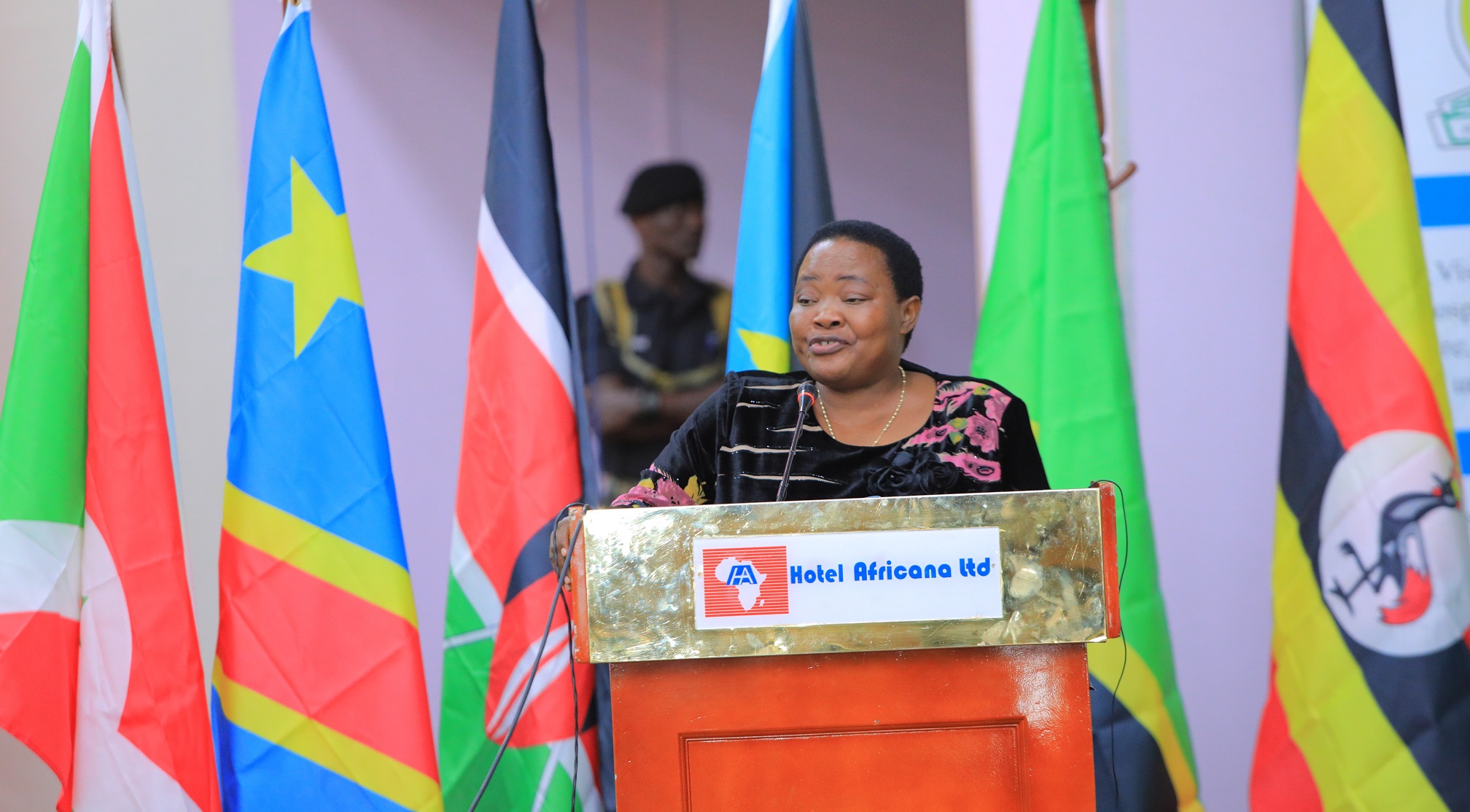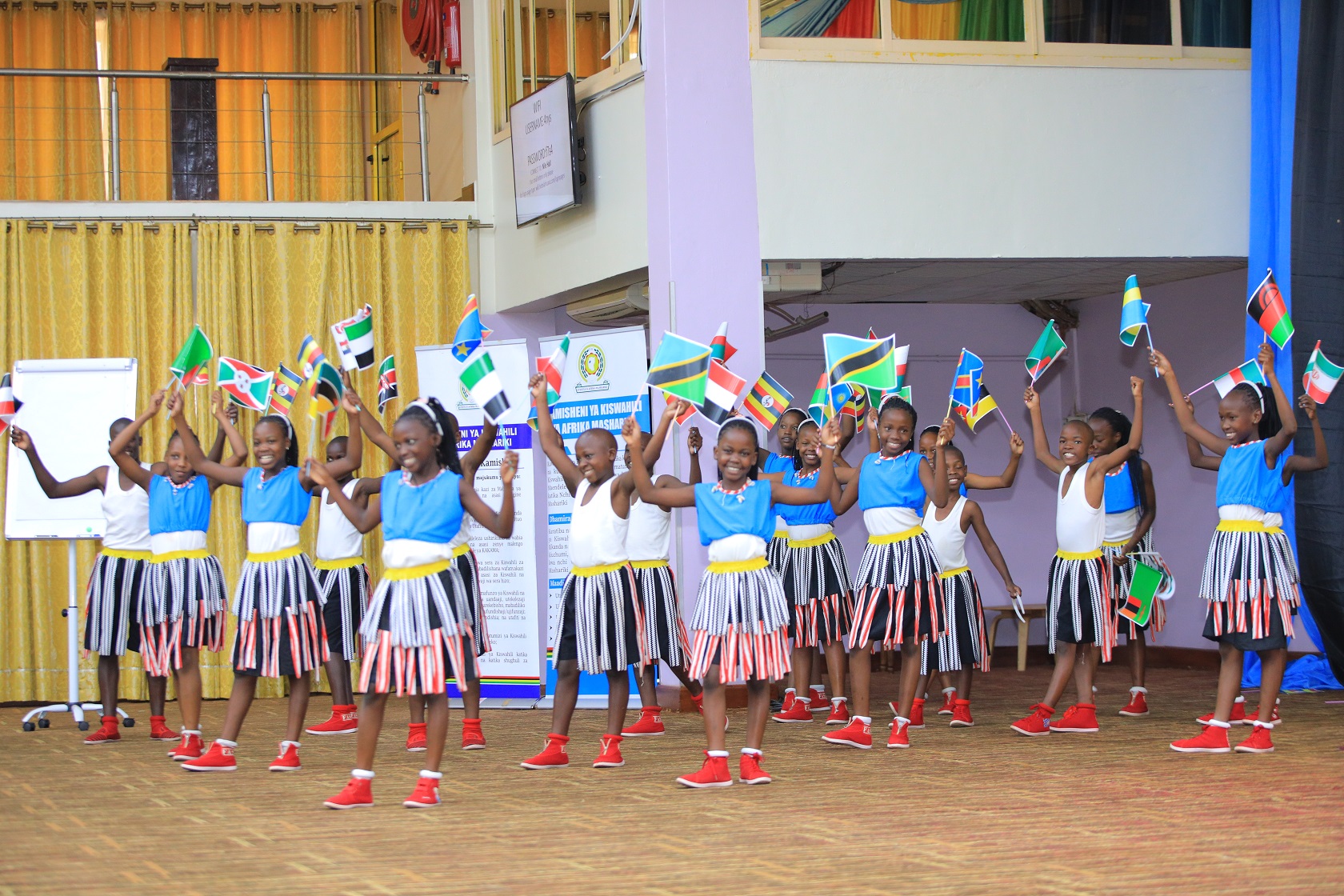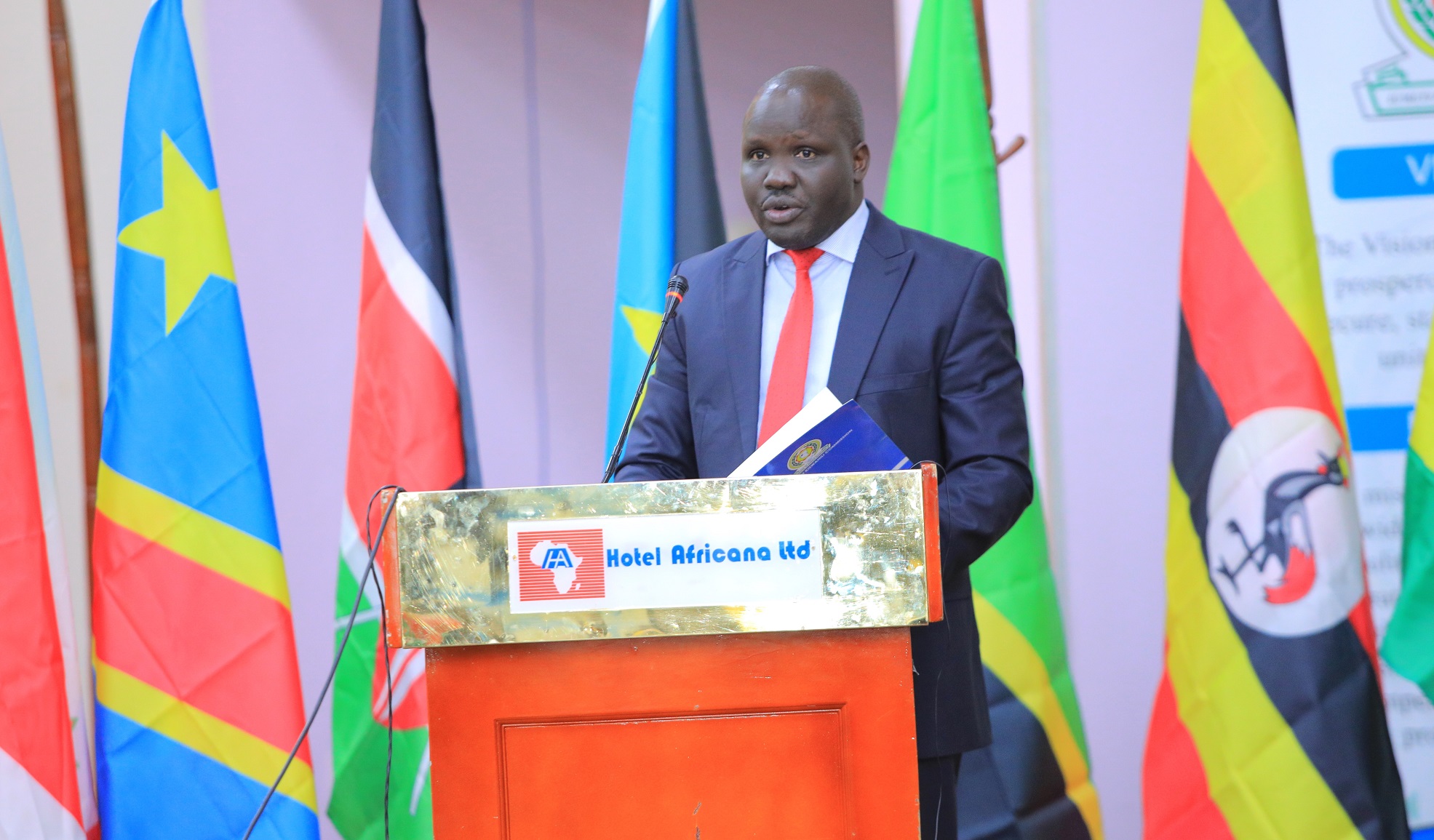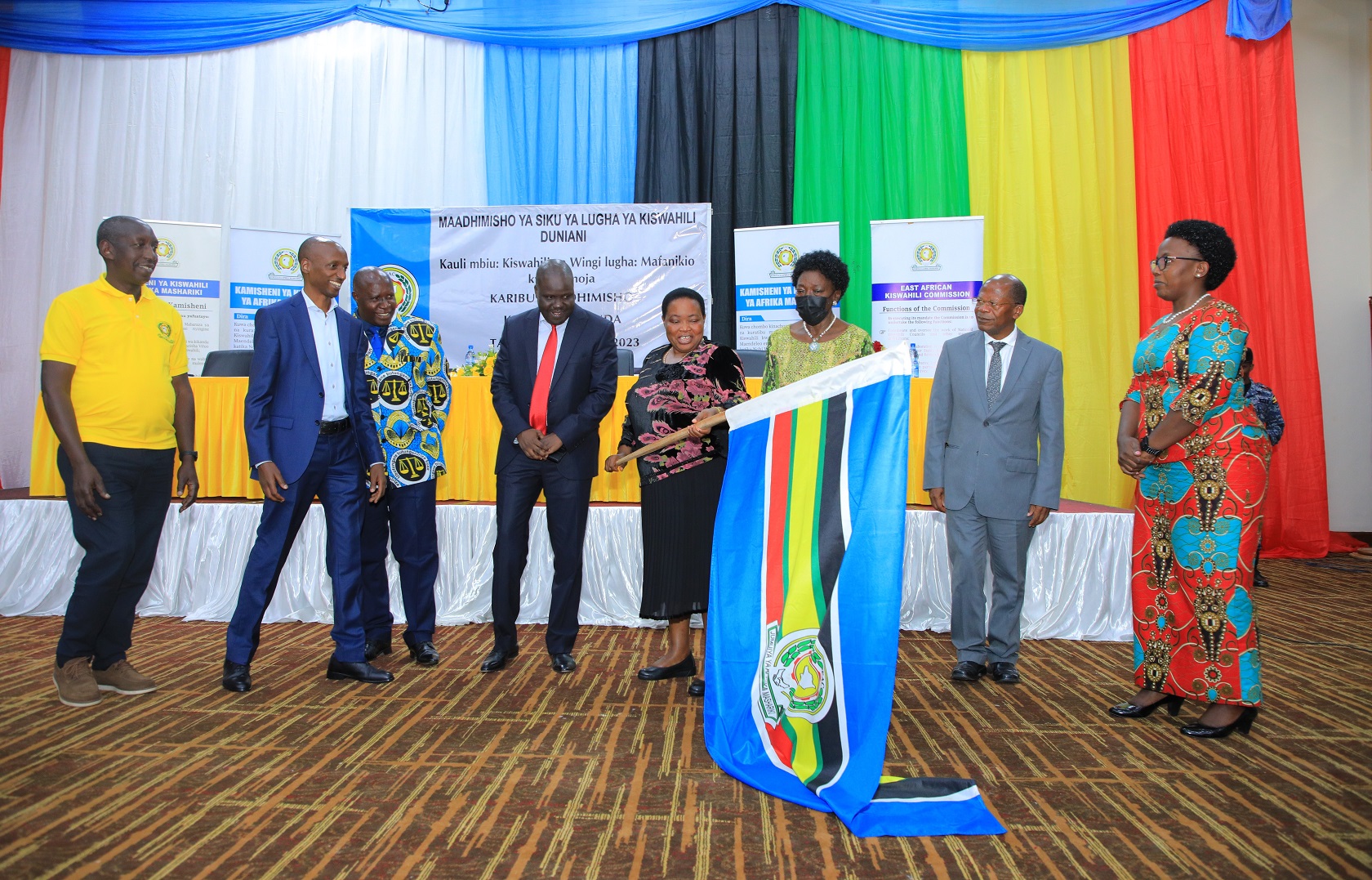
Kiswahili language critical for forging a sense of unity in East Africa
East African Community Headquarters, Arusha, Tanzania, 7th July, 2023: The Prime Minister of Uganda, Rt. Hon. Robinah Nabbanja, has underscored the importance of the Kiswahili language in forging a sense of East Africanness and unity on the journey towards an integrated East Africa.
Rt. Hon. Nabbanja said that the East African region was highly diverse ethnically and linguistically citing 56 tribes in Uganda, 42 in Kenya and more than 120 Tanzania, adding that Kiswahili would come in handy in forging a common sense of identity for all East Africans.
“As East African Community we need to create a shared sense of identity within a highly diverse linguistic society and promote East African unity,” said the PM, adding that for Uganda to smoothly integrate in the EAC, it should consider the crucial role of Kiswahili in promoting the regional integration agenda for sustainable development.
The PM said that the EAC’s small disintegrated countries can do so little in terms of trade and investment and reaffirmed the need for the region to, as a matter of survival, integrate Partner States’ economies to create bigger markets including utilising the social aspects such as promoting use of Kiswahili.
PM Nabbanja was speaking in Kampala, Uganda where she represented H.E. President Yoweri Museveni during the 2nd EAC World Kiswahili Language Day celebrations.
The PM said that it was unfortunate that Africa with all its natural resources contributes only three per cent to global trade.
“The reason for this paradoxical situation is quite obvious. It is simply because colonialists split us into small pockets of economies called ‘sovereign countries’ by creating artificial borders. Through these borders we have continued to compete with each other’s over markets, creating tariffs and non-tariff barriers and all sorts of other obstacles between ourselves. We have not fully exploited and harnessed our competitive advantages by working together in collaboration,” said Hon. Nabbanja.
“On account of this, our countries continue to lag behind because we are not fetching a competitive price from our products. We do not add value to our raw materials but sell them at giveaway prices. Hence our persistent low participation in global trade,” added the PM.

In her remarks, Uganda’s 1st Deputy Prime Minister and Minister of EAC Affairs, Rt. Hon. Rebecca Kadaga, efforts were at an advanced level to inculcate Kiswahili in government procedures through Kiswahili Focal points in all arms of government.
“Cabinet Ministers have taken up Kiswahili lessons from 9.00 am to 10.00 am every Cabinet Day. I also wish to inform you that the Judiciary has also taken up learning of Kiswahili and when I presented a statement to Parliament on Tuesday, 4th July, 2023, the Parliament of Uganda pledged to take it up and roll out the learning of Kiswahili with the Honourable Members,” said the DPM.
“I wish to emphasise that, there is a need to enhance ability to communicate in Kiswahili by the business persons engaging in cross-border trade, hence enhancing intra-regional trade and therefore facilitating implementation of the Common Market Protocol,” said Hon. Kadaga.
The DPM said that promoting Kiswahili will create employment opportunities for translators and interpreters of Kiswahili thereby contributing to reducing youth unemployment, adding that Kiswahili can be used to collectively promote and market the EAC as a Single Tourist Destination.
“Kiswahili can be of strategic use in political spheres, influencing attitudes change, opinions and behavior of citizens and stakeholders and secure political support for the integration agenda at the national level. Kiswahili when well used can become an effective tool for social mobilization, advocacy, in the medical field,” said the DPM.

Speaking at the event, the EAC Deputy Secretary General in charge of Infrastructure, Productive, Social and Political Sectors, Hon. Andrea Aguer Ariik Malueth, hailed the efforts being made by the East African Kiswahili Commission (EAKC) to partner with the EAC Youth Network in driving their respective agenda for mutual benefit.
“Of particular significance is the proposed initiative to establish the EAKC Youth Engagement (EYE). This proposal is in tandem with the EAC Youth Policy and the AU Youth Charter that take into account the youth factor in development. While the Commission will reap the youth dividend, the youth will in turn benefit from the Commission through existing and emerging opportunities in employment, education and entrepreneurship. We look forward to collaborating with both the Commission and the youth in working towards realizing their full potential,” said Hon. Malueth.
Hon. Malueth, who represented the EAC Secretary General, Hon. (Dr.) Peter Mathuki, said that it was encouraging that in most of the EAC Partner States, Kiswahili has been adopted as either an official or national language and is being taught in the school system at different levels.
“We urge the Partner States to put even more efforts at teaching Kiswahili in the school system as this will ensure that most of our young populations grow up with the right aptitudes and attitudes for Kiswahili. We further encourage universities and other specialised centres for Kiswahili teaching and research to collaborate in enhancing capacity building,” said the DSG.
“The learning and use of Kiswahili should however not be restricted to the school system but be extended to as many citizens as possible in various domains. There are several approaches that could be adopted to facilitate this. Our region could in the end be the leading reservoir of Kiswahili experts who could be utilized and even exported to other world regions,” he added.

Also present at the event were the Judge President of the East African Court of Justice, Justice Nestor Kayobera, the EAC Executive Secretary, Dr. Caroline Asiimwe, Uganda’s Minister of Works and Transport, Hon. Katumba Wamala and the Minister of State for Education, Hon. (Dr.) John Muyingo, the PS EAC Affairs, Ms. Edith Mwanje, Heads of EAC Institutions, Members of the Diplomatic Corps, among other dignitaries.
For more information, please contact:
Simon Peter Owaka
Senior Public Relations OfficerCorporate Communications and Public Affairs DepartmentEAC SecretariatArusha, TanzaniaTel: +255 768 552087Email: This email address is being protected from spambots. You need JavaScript enabled to view it.
About the East African Community Secretariat:
The East African Community (EAC) is a regional intergovernmental organisation of seven Partner States, comprising the Republic of Burundi, the Democratic Republic of Congo, the Republic of Kenya, the Republic of Rwanda, the Republic of South Sudan, the Republic of Uganda and the United Republic of Tanzania, with its headquarters in Arusha, Tanzania.
The EAC Secretariat is ISO 9001: 2015 Certified
